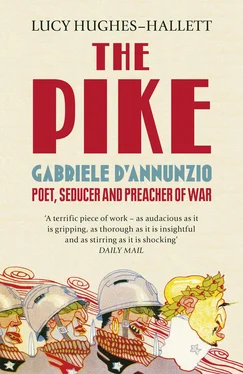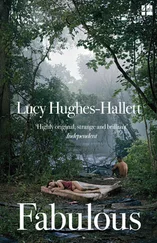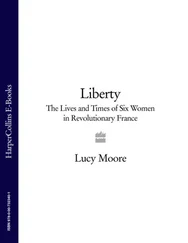The place became a political laboratory. Socialists, anarchists, syndicalists, and some of those who had begun, earlier that year, to call themselves fascists, congregated there. Representatives of Sinn Féin and of nationalist groups from India and Egypt arrived, discreetly followed by British agents. Then there were the groups whose homeland was not of this earth: the Union of Free Spirits Tending Towards Perfection who met under a fig tree in the old town to talk about free love and the abolition of money, and YOGA, a kind of political-club-cum-street-gang described by one of its members as ‘an Island of the Blest in the infinite sea of history’.
D’Annunzian Fiume was a Land of Cockaigne, an extra-legitimate space where normal rules didn’t apply. It was also a land of cocaine (fashionably carried in a little gold box in the waistcoat pocket). Deserters and adrenalin-starved war veterans alike sought a refuge there from the dreariness of economic depression and the tedium of peace. Drug dealers and prostitutes followed them into the city: one visitor reported he had never known sex so cheap. So did aristocratic dilettantes, runaway teenagers, poets and poetry lovers from all over the Western world. Fiume in 1919 was as magnetic to an international confraternity of discontented idealists as San Francisco’s Haight-Ashbury would be in 1968; but, unlike the hippies, d’Annunzio’s followers intended to make war as well as love. They formed a combustible mix. Every foreign office in Europe posted agents in Fiume, anxiously watching what d’Annunzio was up to. Journalists crammed the hotels.
D’Annunzio was already a bestselling novelist, a revered poet, and a dramatist whose premieres were attended by royalty and triggered riots. Now he boasted that in Fiume he was making an artwork whose materials were human lives. Fiume’s public life was a nonstop street-theatre performance. One observer likened life in the city to an endless fourteenth of July: ‘Songs, dances, rockets, fireworks, speeches. Eloquence! Eloquence! Eloquence!’
By the time his occupation of Fiume came to an end, d’Annunzio’s dream of an ideal society had deteriorated into a nightmare of ethnic conflict and ritualised violence. For over a year it suited none of the great powers to bestir themselves to eject him, but when, eventually, an Italian warship arrived in the harbour and bombarded his headquarters, he capitulated after a five-day fight. But for the duration of his command, Fiume was – precisely as he had intended it should be – the stage for an extraordinary real-life drama with a cast of thousands and a worldwide audience, one in which some of the darkest themes of the next half-century’s history were announced.

D’Annunzio believed he was working to create a new and better world order, a ‘politics of poetry’. So did observers from every point on the political spectrum, from the conservative nationalists who eagerly volunteered to join his Legion, to Vladimir Ilyich Lenin, who sent him a pot of caviar and called him the ‘only revolutionary in Europe’. His followers saw Fiume as a place where life could begin afresh – rinsed clean of all impurities, freer and more beautiful than ever before. But the culture created there rapidly took on a character which, seen in retrospect, is hideous. Black uniforms decorated with lightning flashes which made malign supermen of their wearers; military spectacles staged as though they were sacred rites; a cult of youth which degenerated into licensed delinquency; the bullying of ethnic minorities; the never-ending sequence of processions and festivals designed to glorify an adored leader: all of these phenomena are now recognisable as typical of the politics, not of poetry but of brute power. Later, Benito Mussolini encouraged the writing of a biography of d’Annunzio entitled The John the Baptist of Fascism. D’Annunzio, who saw the fascist leader as a vulgar imitator of himself, was not happy with the suggestion that he was a mere harbinger, preparing the way for Mussolini’s Messiah. But though d’Annunzio was not a fascist, fascism was d’Annunzian. The black shirts, the straight-armed salute, the songs and war cries, the glorification of virility and youth and patria and blood sacrifice, were all present in Fiume three years before Mussolini’s March on Rome.
A great deal has been written about the economic, political and military circumstances in which fascism and its associated political creeds flourished. D’Annunzio’s story provides a lens through which to examine those movements from another angle, to identify their cultural antecedents, and the psychological and emotional needs to which they pandered. To watch d’Annunzio’s trajectory from neo-Romantic young poet to instigator of a radical right-wing revolt against democratic authority is to recognise that fascism was not the freakish product of an exceptional historical moment, but something which grew organically out of long-established trends in European intellectual and social life.
Some of those trends were apparently unexceptionable. D’Annunzio was a man of broad and deep culture, thoughtful, widely read in the classics and in modern literature. He spoke for Beauty, for Life, for Love, for the Imagination (his capitals) – all of which sound like good things. Yet he helped to drag Italy into an unnecessary war, not because he believed it would bring any advantage but because he craved cataclysmic violence. His adventure in Fiume fatally destabilised Italy’s democracy, and opened the way for all the bombast and thuggery of fascism. He prided himself on his gift for ‘attention’, for fully experiencing and celebrating life’s abundance. ‘I am like the fisherman who walks barefoot over a beach uncovered at ebb tide, and who stoops, again and again, to identify and gather up whatever he feels moving under the soles of his feet.’ He posed as a new St Francis, lover of all living things. Yet his wartime rants are, in every sense, hateful. Italy’s enemies are filthy. He ascribes grotesque crimes to them. He calls out for their blood.
‘His gift for pleasing is diabolical,’ wrote Filippo Tommaso Marinetti. Even people who heartily disapproved of d’Annunzio found him irresistible. Similarly, reprehensible though the Europe-wide fascist movements were (and are), history demonstrates the potency of their glamour. To guard against their recurrence we need not just to be aware of their viciousness, but also to understand their power to seduce. D’Annunzio was never as supportive of fascism as Mussolini liked to make out. He jeered at the future Duce as a cowardly windbag. He despised Hitler too. But it is certainly true that his occupation of Fiume drastically undermined the authority of Italy’s democratic government, and so indirectly enabled Mussolini’s seizure of power three years later; that both Mussolini and Hitler learned a great deal from d’Annunzio; and that an account of d’Annunzio’s life and thought amounts to a history of the cultural elements that eventually came together, in the two decades following d’Annunzio’s annexation of his City of the Holocaust, to ignite a greater and more terrible holocaust than any he had ever envisaged.
The poet was fifty-six years old when he set out for Fiume, as notorious for his debts and duels and scandalous love affairs as he was celebrated for his wartime exploits and his literary gifts. A plane crash had left him blind in one eye, and, as he embarked on his great adventure, he was so weakened by an alarmingly high temperature that he could barely stand (something not to be taken lightly during a period when some fifty million people died of Spanish flu).
Small, bald, with narrow sloping shoulders and, according to his devoted secretary, ‘terrible teeth’, he was unimpressive to look at, but the long tally of his lovers included the ethereally lovely Eleonora Duse, one of the two greatest actresses in Europe (Sarah Bernhardt was her only rival), and he could manipulate a crowd as easily as he could entice a woman.
Читать дальше













